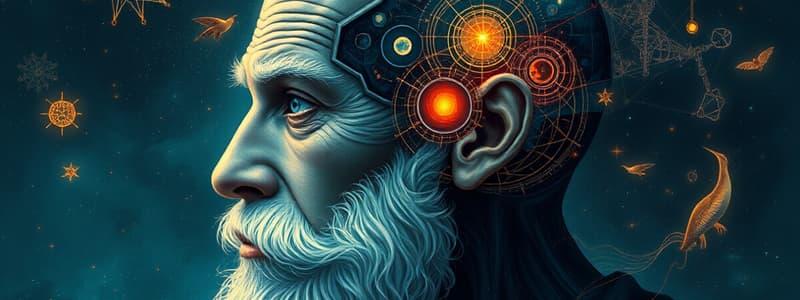Podcast
Questions and Answers
What is Psychoanalytic Theory primarily associated with?
What is Psychoanalytic Theory primarily associated with?
- Social influences on mental health
- Cognitive processes and decision making
- The first formal theory of personality (correct)
- Behavioral responses to stimuli
Where was Sigmund Freud born?
Where was Sigmund Freud born?
- Prague, Czech Republic (correct)
- Budapest, Hungary
- Berlin, Germany
- Vienna, Austria
In which year did Freud receive his medical degree?
In which year did Freud receive his medical degree?
- 1881 (correct)
- 1878
- 1890
- 1884
What was the cause of Freud's death?
What was the cause of Freud's death?
Who assumed leadership of the Freudian movement after Freud's death?
Who assumed leadership of the Freudian movement after Freud's death?
Flashcards are hidden until you start studying
Study Notes
Sigmund Freud - Overview
- Sigmund Freud, a pioneer in psychology, developed the Psychoanalytic Theory.
- Born on May 6, 1856, in Czech Republic, he moved to Vienna with his family by 1860.
- Obtained a medical degree from the University of Vienna in 1881 and researched neuroanatomy.
Family and Death
- Freud had six children with his wife, Martha Bernays (three boys and three girls).
- Anna Freud, his youngest daughter, led the Freudian movement after his death.
- Died from cancer on September 23, 1939; controversy surrounds his death, with some suggesting assisted suicide.
Psychoanalytic Theory - Structure of Personality
- The personality comprises three levels of awareness:
- Id: Present at birth, driven by instinctual desires. Functions on the pleasure principle, lacking moral sense or reality understanding.
- Ego: Develops from the id, balancing desires with reality. Operates on the reality principle.
- Superego: Represents moral standards and ideals, guiding behaviors based on right and wrong.
Consciousness Levels
- Conscious Mind: Immediate awareness of thoughts and perceptions.
- Preconscious Mind: Contains memories and thoughts that are not currently in awareness but can be easily accessed.
- Unconscious Mind: Houses repressed memories and instincts driving behavior, often beyond conscious control.
Dynamics of Personality
- Behavior is motivated by underlying drives or instincts categorized as:
- Eros (Life Instincts): Related to survival, sexual instincts, and reproduction.
- Thanatos (Death Instincts): Associated with aggression and harmful behaviors.
Developmental Stages
- Stages of development include:
- Oral Stage: Pleasure derived from mouth activities. Risks of fixation include dependency or aggression.
- Anal Stage: Control and regulation associated with toilet training significantly impact personality.
- Phallic Stage: Focus on genitals; Oedipus and Electra complexes arise, shaping future relationships.
Psychopathology
- Psychoanalytic theory explains ‘abnormal’ behavior through neurosis and psychosis:
- Neurosis: Often presents with symptoms linked to stress; individuals maintain reality contact.
- Psychosis: Characterized by disconnection from reality, including delusions and hallucinations.
Psychotherapy Techniques
- Free Association: Clients express thoughts spontaneously to reveal unconscious processes.
- Therapeutic focus is on exploring repressed material and resolving inner conflicts to alleviate mental disorders.
Studying That Suits You
Use AI to generate personalized quizzes and flashcards to suit your learning preferences.



